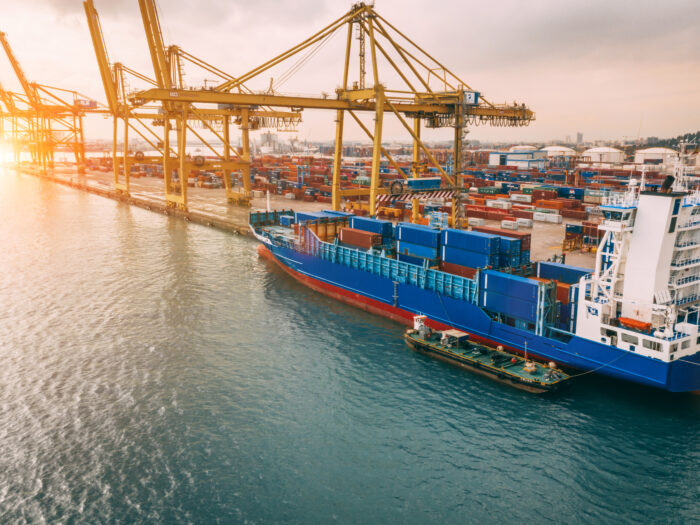Sponsored: Munich Re
How Inflation and Supply Chain Disruption Are Impacting Marine Cargo Insurance

The term “supply chain” has become common parlance since the early days of the pandemic, when people would enter stores to find shelves emptied of toilet paper, canned foods and other common household goods.
Delays caused by factory and port closures due to China’s Zero-COVID policy, the impact of Russia’s attack on Ukraine, increasingly frequent and strong storms and other factors have created a backlog of ships stuck at sea and in ports, waiting to be unloaded.
Even once products are unloaded from the ships, it can take goods weeks to reach their destination due to trucker and chassis shortages.
“While delivery times have gotten better post COVID, delays still exist,” said Karen Rzeszutko, Senior Vice President, Underwriting Marine with Munich Re Specialty Insurance Group. “A shipment that would’ve normally taken three weeks, maybe now it’s taking four weeks or longer.”
All of these delays are causing businesses in the logistics and trade community to try to move goods more quickly and efficiently. They might pack more shipping containers onto vessels or opt for larger vessels that carry more containers. With more goods on ships and inflation driving up the cost of claims and exacerbating accumulation concerns, logistics providers, cargo owners, and shipping companies should be working with their brokers to make sure their cargo is adequately insured.
How Supply Chain Delays Are Affecting Marine Cargo Insurance

Karen Rzeszutko, Senior Vice President, Underwriting Marine with Munich Re Specialty Insurance Group
One impact of supply chain disruption that is specific to marine cargo insurance is the accumulation of cargo on ships and in warehouses. Accumulation of goods is a danger on two fronts – underinsured shipments and higher than anticipated claims amounts. High volumes and values of cargo owned by the same insured at a single port, warehouse, or ship creates the potential for accumulated cargo values that exceed the ocean marine cargo policy limits and could result in cargo being underinsured. Catastrophic losses and general average declarations that occur on vessels carrying accumulated goods for a single insured can lead to outsized claims.
“Most clients are facing the need to increase their policy limits,” Rzeszutko said. “You want to make sure that your insurance policy will cover the values that you’re transporting.”
Further complicating matters is the rise of super-massive ships to meet the modern supply chain demand. Logistics companies are utilizing these larger ships to transport goods, but as many saw when the Ever Given lodged itself in the Suez Canal in 2021, larger ships can get stuck when trying to navigate narrow waterways, resulting in further delays.
“Ships are being built bigger than they ever were before in order to accommodate the increase in goods that need to be transported,” Rzeszutko said. “It makes it difficult for them to navigate.”
Though a variety of factors have caused shipping delays over the past few years, resulting in claims arising due to delayed transit as well as an increase in theft, Rzeszutko does see things calming down as we head into 2023. Ports are less backed up, allowing for a return to pre-pandemic shipping conditions. “We don’t see as much backup as we had in 2022,” Rzeszutko said.
Cargo owners and logistics providers can further reduce the strain of supply chain delays by working with risk managers who have logistics experience and can help plan alternate routes in the case of poor weather or other events that may result in blocked passage, port closures, or other complicating factors.
“Consider alternate routes as a way to minimize your delays. If adverse conditions mean one route is going to take you three weeks, maybe another route will take you two weeks. There may be an added cost associated with the change, but businesses may choose that option,” Rzeszutko said.
Inflation Is Increasing Marine Cargo Claims Costs. Here’s How
Ships aren’t just carrying more goods; they’re carrying more valuable ones. Inflation has driven up the prices of almost every consumer good as well as the cost of fuel and the cost of carriage. Consequently, when a marine insurance claim occurs, the loss is higher due to the increased price of goods.
Inflation increases risk to cargo indirectly as well. The BSI Cargo Theft Report for 2022 states, “From a cargo crime perspective, as the economy slows down and the cost of living rises, there is an increased demand for cheaper goods. This in turn, indirectly incentivizes cargo theft, as criminals can steal basic goods or high-valued goods and sell them on the black market for significantly cheaper.”
Aside from the increased demand in the marketplace for stolen cargo, inflationary increases in the prices of goods may also make them more appealing to thieves. This again contributes to higher insurance costs or restrictions on policies, Rzeszutko said. When companies are transporting high-value goods in risky areas, insurers may require companies to include GPS tracking devices or employ armed guards before they will write a policy.
“It may become a warranty of the policy depending on the goods that are being transported and the location where the goods are being shipped,” she said.
Ensuring Your Policy Has the Right Limits
With supply chain and inflationary pressures driving up the values of cargo an insured has accumulated on a vessel, logistics service providers, cargo owners, and shipping businesses must be careful that insurance limits are adequate and at times seek to increase their coverage limits to ensure their shipments are protected.
“Talk to your insurance broker and make sure that you have limits on your policy that are adequate for your exposure,” Rzeszutko said.
Munich Re offers ocean marine insurance solutions that protect an insured’s assets while they’re in transit or in storage. The strong underwriting team behind these policies can help insureds that need to increase their limits or those who are looking for coverage as they navigate supply chain and inflation risks.
“Most clients are facing the need to increase their policy limit,” Rzeszutko said. “You want to make sure that your insurance policy will cover the values that you’re transporting.”
The right broker, risk manager and carrier team will assess the particular risks logistics service providers, cargo owners, and shipper faces and what policy solutions will work best. Many companies may benefit from one overarching policy, rather than covering the risks shipment by shipment.
“A primary policy designed to cover all shipments, where you have an established shipping history, can be tailored to your business needs. Insuring goods shipment by shipment may provide less specialized coverage,” Rzeszutko said.
Munich Re boasts a marine cargo underwriting team with a wealth of industry knowledge and an in-house claims team prepared to support insureds in the event of a loss.
“We bring a breadth of underwriting experience as well as a robust in-house claims team,” Rzeszutko said. “Those two factors differentiate us in the marketplace.”
Supply chain and inflation exposures are shifting quickly, so insureds will want to work with a carrier that remains on top of industry trends. The team at Munich Re has extensive knowledge of the industry and is always watching for new ways to support its clients.
In addition to supply chain and inflation concerns, Rzeszutko says, they’ve seen increased interest in cargo owners shifting their businesses to challenging new commodities such as renewable energy, seeking insurance policies covering transportation of solar panels or wind turbines.
Whatever the risk, partnering with a strong carrier with top underwriting and claims talent can help cargo owners know they will be protected in the event of a claim, no matter how exposures shift.
To learn more, visit: https://www.munichre.com/us-non-life/en/solutions/specialty-insurance/ocean-marine-cargo-coverage.html.
This article was produced by the R&I Brand Studio, a unit of the advertising department of Risk & Insurance, in collaboration with Munich Re Specialty Insurance Group. The editorial staff of Risk & Insurance had no role in its preparation.










